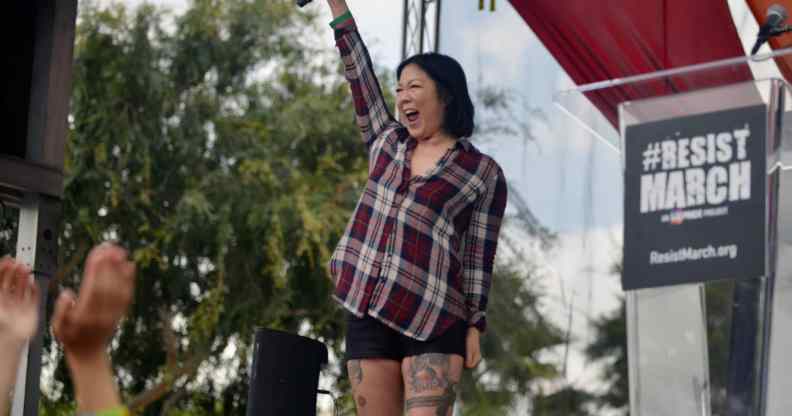Margaret Cho feels ‘scared to go out’ as anti-Asian racism soars in America

Margaret Cho. (Chelsea Guglielmino/Getty Images)
Bisexual actor Margaret Cho has said she feels like a “target” amid a dizzying and alarming surge in anti-Asian racism in America.
Speaking to Monét X Change and Lady Bunny on the Ebony & Irony podcast, Cho commented on the rise in violence against the Asian community in San Francisco, California, where she grew up.
Only last month, startling scenes of older Asian women being brazenly battered in the Bay Area took place in the lead up to the Lunar New Year holiday last month.
The killing of eight people working at spas in Atlanta, Georgia, including six Asian women, has fuelled outrage, frustration and despair over the nation’s longstanding failure to curb anti-Asian sentiment.
Margaret Cho: ‘I’m scared to go out’
Margaret Cho echoed this sense of fear and forced vigilance. “I’m scared to go out,” the 52-year-old said.
“As an older Asian woman, it’s actually like, it’s hard out there for people like me. It’s very much like being the target.”
Cho went on to reflect on how this simmering hatred towards Asian people, regardless of who perpertrates it, has a common cause – white supremacy.
“Even though there are instances of Black-on-Asian violence, it’s still because of white supremacy,” she said.
“We’re put together from this idea of the myth of the model minority, and that statement is such a damaging one — to be a model minority — because it makes it seem like other minorities are not the model.”
She added: “It pits us against each other as if our only value is our relationship to the white patriarchy.”
It comes after the Grammy-nominated stand-up comedian told PBS News Hour Weekend how, for some Asian Americans, racism is a “deep well of shame” which prompts some not to report the violence they face to the authorities.
“I think this practice comes out of PTSD from wartime, you know, and having all of these things occur in your family’s history,” she said.
“And then to bring it over here looking for the American dream, for some kind of escape from all of the trauma that we experience there.
“And then to have this new, new terrible thing, racism, which my family experienced, such intense racism coming to San Francisco from Korea in 1964 that they’ve never discussed.
“I think all of these incidents now bring up so much shame, so much heartache, so much past trauma that I’m sure this is so underreported.”

